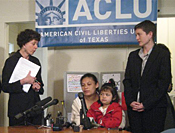Court Says ACLU Likely to Prevail on Claims Regarding Immigrant Children Detained at Hutto Facility in Texas
FOR IMMEDIATE RELEASE
CONTACT: media@aclu.org
Calling Detention an “Urgent Problem,” Judge Orders Trial for August

Former Hutto detainees joined Barbara Hines (left), Clinical Professor of Law at the University of Texas School of Law and co-counsel in the case, and Lisa Graybill, Legal Director of the ACLU of Texas, at the press conference.
Learn more >>
AUSTIN, TX – In a ruling issued late Monday, a Texas federal court found that the American Civil Liberties Union is “highly likely to prevail” at trial on its claims that the detention of immigrant children at the T. Don Hutto facility in Taylor, Texas is an abuse of discretion by federal officials and violates applicable legal standards.
“We are very pleased that the court has found that our clients are highly likely to prevail at trial on the merits of their claims. Federal officials cannot exempt themselves from the law in the name of immigration enforcement,” said Vanita Gupta, a staff attorney with the ACLU’s Racial Justice Program. “As we’ve said from the start, there are viable alternatives to imprisoning these children that would not compromise law enforcement.”
While U.S. District Court Judge Sam Sparks did not agree to release the children at this point in the proceedings, he recognized that their “continued detention in substandard conditions is an urgent problem,” and ordered that a trial take place in August.
The ACLU, along with the ACLU of Texas, the University of Texas School of Law Immigration Clinic and the international law firm of LeBoeuf, Lamb, Greene & MacRae LLP, filed lawsuits last month on behalf of ten immigrant children, ages three to 16, who were detained with their parents who were awaiting immigration determinations. The lawsuits were filed against Michael Chertoff, Secretary of the U.S. Department of Homeland Security and six officials from U.S. Immigration and Customs Enforcement (ICE). During the course of the litigation, several of the plaintiffs have been released.
The lawsuits charge that by operating the Hutto facility, ICE is violating its duty to comply with provisions set forth in a 1997 settlement agreement in the case of Flores v. Meese. The Flores settlement establishes that children should generally be released promptly to family members when possible and that those who do remain in ICE’s custody be placed in the least restrictive setting available and, regardless of where they are housed, that children be guaranteed basic educational, health, and social benefits and rights.
Judge Sparks determined that the Flores settlement applies to the detained children in this case and that, given the evidence presented, the ACLU is likely to prove at trial that their detention at Hutto violates the Flores settlement’s requirements that minors be placed in a licensed, non-secure facility with adequate conditions. “The Court finds it inexplicable that Defendants have spent untold amounts of time, effort, and taxpayer dollars to establish the Hutto family detention program, knowing all the while that Flores is still in effect,” Judge Sparks said in his ruling. In its order, the court found that because Hutto is not licensed, it “has not been subject to any state regulation at all regarding its treatment of the children in its care.” In addition, citing testimony of an expert psychologist, the judge’s order stated that Hutto is run like a secure facility and that “it seems clear that ‘the facility and the officers exercise a high level of control over virtually every aspect of the families’ functioning.’”
The court also found substantial problems with many types of care provided to children at Hutto including medical care, nutrition, and privacy. According to the order, “The living conditions at Hutto seem questionable in general.” Judge Sparks found evidence that children were threatened with separation from their parents as a disciplinary tool “most troubling” and likely in violation of the Flores requirement that children at Hutto not be subjected to humiliation, mental abuse, or punitive interference with daily living.
“We are gratified that after reviewing evidence of the conditions at Hutto, Judge Sparks finds it likely that the government has been violating its obligations under Flores,” said Lisa Graybill, Legal Director of the ACLU of Texas. “Treating children like prisoners is not only contrary to legal standards, but it is also simply immoral and un-American.”
Barbara Hines, a Clinical Law Professor with the University of Texas School of Law Immigration Clinic, added: “Although the judge did not believe he could release these families at this point in the legal process, we are looking forward to convincing him at trial that release, under proper conditions, is the appropriate remedy. Even if conditions at Hutto improve, no amount of fresh paint on the walls can make Hutto the least restrictive environment available for these children, as required by law.”
A copy of the order is available online at: www.aclu.org/immigrants/detention/29299lgl20070409.html
Stay Informed
Every month, you'll receive regular roundups of the most important civil rights and civil liberties developments. Remember: a well-informed citizenry is the best defense against tyranny.


